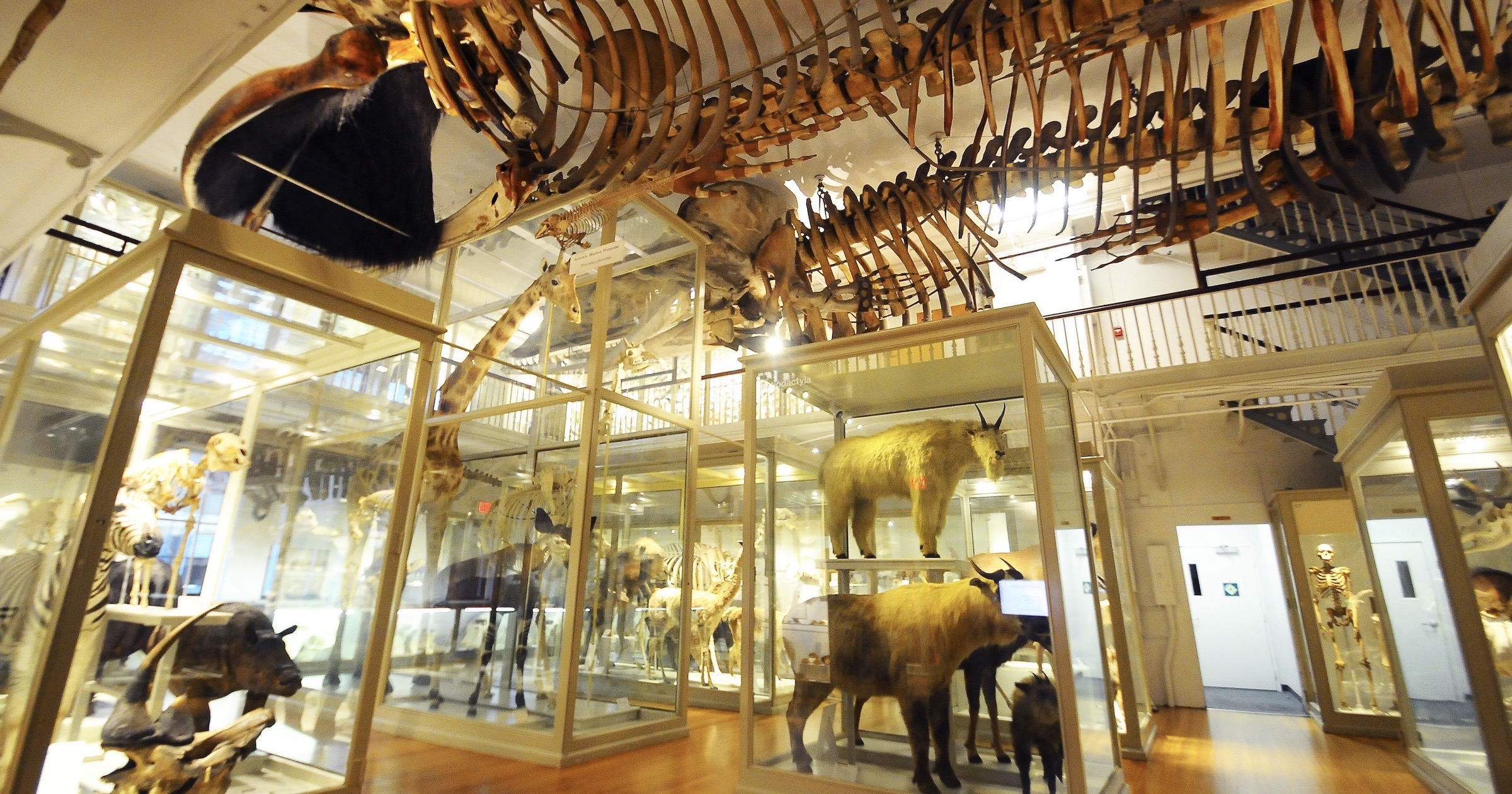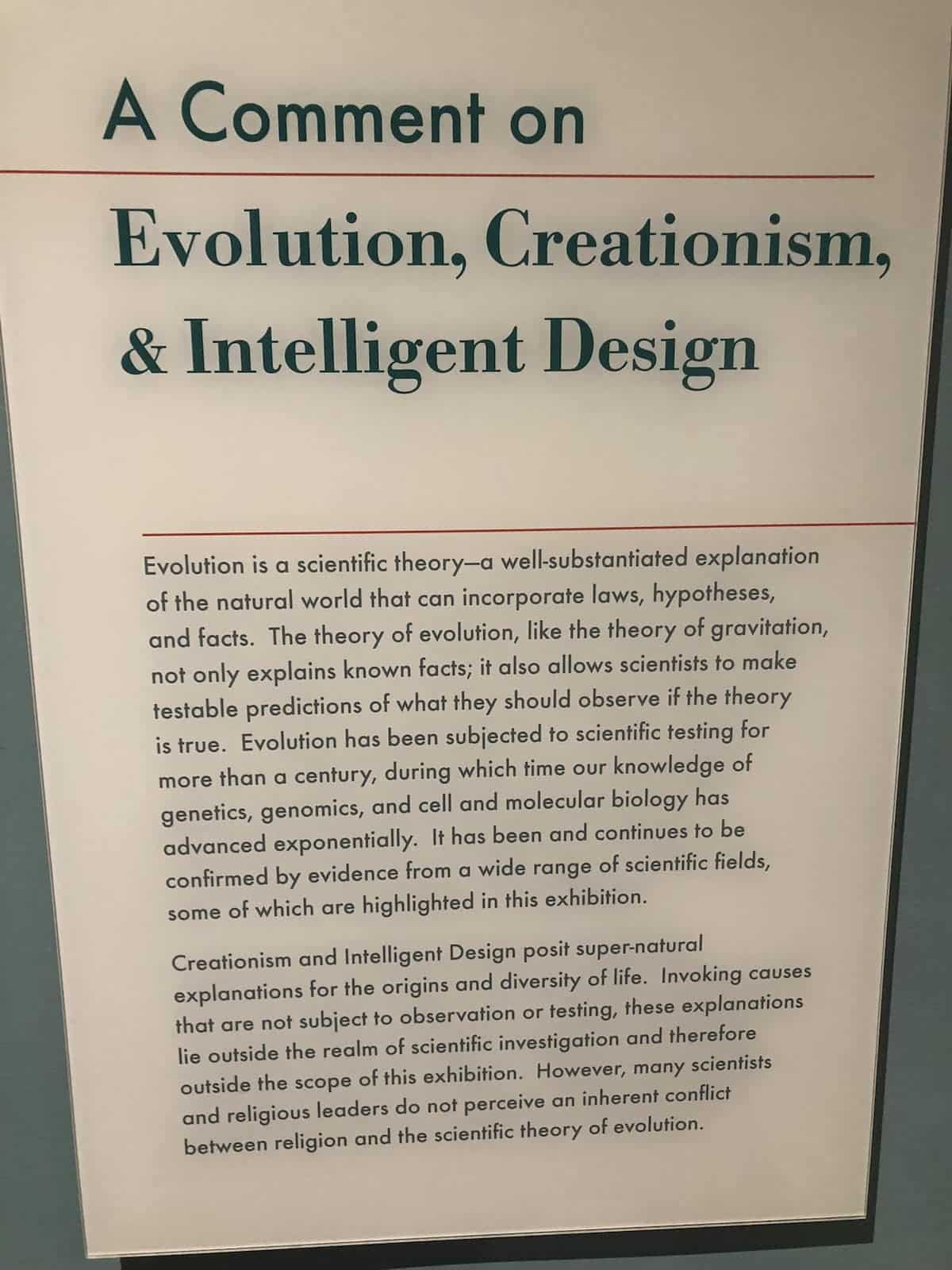 Evolution
Evolution
 Intelligent Design
Intelligent Design
Let’s Help Harvard Understand Intelligent Design

Last week, my wife and I spent an afternoon at the Harvard Museum of Natural History, in Cambridge, MA, near where we live. We both were generally impressed by the exhibitions, particularly the dinosaur section, and would recommend the museum to anyone visiting Boston. I was, however, quite disappointed to see this notice at the entrance to the display on evolution:

It was disappointing to see the inaccurate representation of intelligent design (ID), along with the poor scientific epistemology.
A “Super-Natural Explanation”?
First, proponents of ID have long stressed that ID, in its purest sense, does not necessarily postulate a supernatural cause but is consistent with a natural or supernatural intelligence. Furthermore, I would contend that the natural / supernatural distinction is problematic. What precisely is meant when a phenomenon is described as supernatural, and by what set of criteria is it distinguished from the natural? Often, the word “supernatural” is used to describe the capacity to perform miracles, defined as violations of natural law. I would, however, offer a more nuanced definition of a miracle, which is that a miracle describes an interruption in the way nature normally behaves when left to itself. A miracle does not violate natural law, because natural law only describes what happens when nature is left to itself – not what happens when there is an intervention by an external agent. I am not by any means the first to define a miracle in these terms. Indeed, the atheist philosopher John Mackie in his classic book, The Miracle of Theism, defines a miracle along similar lines.1 As agents ourselves, we have the capability of interrupting the normal course of nature, determined by natural law. When I consciously choose to catch a ball with my hands, I am interrupting the trajectory it would have otherwise taken if left to itself. Agency itself is not governed by natural law, nor can it be reduced to material constituents. Human free will — my belief in which I take to be strongly justified by direct acquaintance — is, in my view, utterly incompatible with a materialistic reductionist perspective on the mind. Since, in my judgment, the strong burden of proof required to demonstrate that the strong appearance of free agency is merely illusory has not been met, this provides a strong prima facie justification for believing the mind to not be reducible to material components. Few would want to use the term “supernatural” to describe the human mind. A more helpful distinction, then, is between material and non-material causes. But non-material causes — assuming my judgment about the non-reducibility of agency to be correct — are already demonstrably a part of the natural world, since all of us have minds. Thus, the fact that ID postulates a non-material entity cannot be used to exclude ID from the natural sciences. Moreover, if our epistemology arbitrarily excludes one possible answer to an inquiry a priori, there is a real danger of being led to an incorrect conclusion about the natural world.
“Observation”
Second, the invocation of an unobservable entity should not be a demarcating factor that renders ID unscientific, for that would exclude other scientific disciplines, such as particle and nuclear physics, as well. Unobservable entities can often be detected by their effects, even without direct observation. For example, black holes are not directly observable since they do not emit electromagnetic radiation that can be detected with telescopes. Their existence and presence, however, is inferred by the effects that they exert on nearby matter, since gas flowing around a black hole increases in temperature and emits radiation that can be detected (their gravitational effects on surrounding objects, such as nearby stars, and the bending of light passing by a black hole, can also reveal the presence of a black hole).
“Testing”
Third, ID is testable in the same way that other hypotheses purporting to explain events in the distant past (including evolution by natural selection) are tested — by the historical abductive method of inference to the best explanation.2 Given that functionally specific information content is, in every other realm of experience, habitually associated with conscious activity and no other category of explanation has been demonstrated to be causally sufficient to account for its origin, ID is the most causally adequate explanation of the relevant data.
“Predictions”
Fourth, a scientific theory can be well justified even if it does not make strong predictions; it just needs to render the evidence significantly more probable than it would have otherwise been. For example, the hypothesis that you were in the vicinity of a nuclear plant does not strongly predict that you will have radioactive poisoning (few such workers suffer this). But if you did have radioactive poisoning, it would be significant evidence that you were in the vicinity of a nuclear plant since that data is more expected (or, less surprising) given the truth of the hypothesis than given its falsehood. Thus, even if ID only weakly predicts the observed data, it can still be strongly justified if the data is extremely unlikely if ID is false. ID, I would argue, also has a reasonably high intrinsic plausibility (what probability theorists call prior probability) given the independent evidence of there being a mind behind the universe who has an interest in creating complex life (that is, the evidence of cosmic fine tuning3 and prior environmental fitness4). It shouldn’t be too surprising, then, if the data also indicate that life was purposely brought about.
An “Inherent Conflict”?
Fifth, ID is not postulated because there is a perceived incompatibility between evolution and religion, but rather because we understand it to be the best interpretation of the scientific evidence. That being said, the “many scientists and religious leaders” who “do not perceive an inherent conflict between religion and the scientific theory of evolution” are correct that God and naturalistic evolution are logically compatible. However, naturalistic evolution, if true, would constitute significant evidence against theism and by extension religion. Why? First, if the conclusion that teleology best explains biological phenomena is evidence for theism, it necessarily follows that the falsehood of this conclusion would be evidence against theism. Second, atheism, and in particular naturalism (which, I would contend, is the most consistent version of atheism), strongly predicts that there be a naturalistic evolutionary account of life’s origins and development on earth. However, this is significantly less well predicted by theism. Therefore, though not by itself sufficient grounds on which to reject theism, unguided evolution — being more surprising given theism than given atheism — would, if true, constitute significant evidence against theism.
It is unfortunate that the administrators of the Harvard Museum of Natural History seem to have failed to do their due diligence to understand the claims of ID, and how its advocates propose to test it, before dismissing it as being outside of the scope of science.
Notes
- John L. Mackie, The Miracle of Theism: Arguments For and Against the Existence of God (Oxford: Oxford University Press, 1983), kindle.
- Stephen Meyer, Signature in the Cell: DNA and the Evidence for Intelligent Design (San Francisco: HarperOne, 2010).
- Geraint F. Lewis & Luke A. Barnes, A Fortunate Universe: Life in a Finely Tuned Cosmos (Cambridge: Cambridge University Press, 2017).
- Michael Denton, The Miracle of Man: The Fine Tuning of Nature for Human Existence (Seattle: Discovery Institute Press, 2022).
